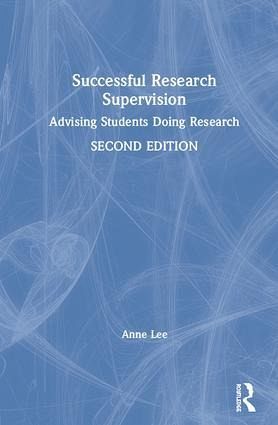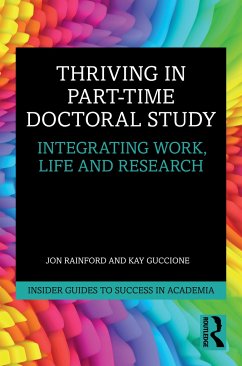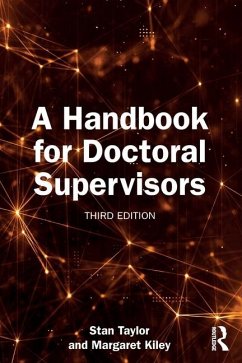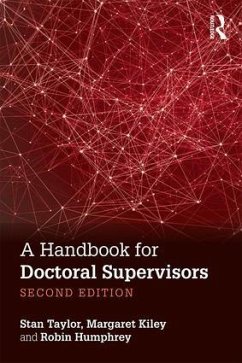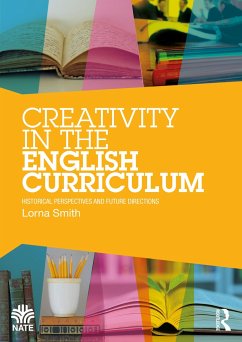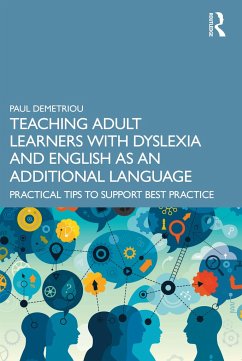Versandkostenfrei!
Versandfertig in 1-2 Wochen
Weitere Ausgaben:

PAYBACK Punkte
77 °P sammeln!





The new and fully updated second edition of Successful Research Supervision offers a research-based practical framework for academics to examine and develop their effectiveness as research supervisors.
Anne Lee is an independent academic. She is an Honorary Research Fellow at the University of Bristol, UK and was Associate Professor at the University of Stavanger, Norway. Find out more about her work at www.drannelee.wordpress.com
Produktdetails
- Verlag: Taylor & Francis Inc
- 2 ed
- Seitenzahl: 370
- Erscheinungstermin: 13. August 2019
- Englisch
- Abmessung: 240mm x 161mm x 24mm
- Gewicht: 704g
- ISBN-13: 9780815376989
- ISBN-10: 0815376987
- Artikelnr.: 57497116
Herstellerkennzeichnung
Libri GmbH
Europaallee 1
36244 Bad Hersfeld
gpsr@libri.de
1st edition
A fabulous resource for graduate advisors.
Professor Eric Mazur, Harvard University
2nd edition
Anne's commitment to supporting supervisors is evident from this comprehensive guide.
Gill Houston, Chair, UK Council for Graduate Education
Whether you're new to research supervision or an old hand, have a difficult student or simply want to update your supervisory skills, Anne Lee's comprehensive and easy to use book on supervision is for you. It offers advice on a variety of pedagogic approaches to supervising, suggests ways of strengthening student acculturation and developing critical thinking, helps you build strong supervisor/student relationships,
A fabulous resource for graduate advisors.
Professor Eric Mazur, Harvard University
2nd edition
Anne's commitment to supporting supervisors is evident from this comprehensive guide.
Gill Houston, Chair, UK Council for Graduate Education
Whether you're new to research supervision or an old hand, have a difficult student or simply want to update your supervisory skills, Anne Lee's comprehensive and easy to use book on supervision is for you. It offers advice on a variety of pedagogic approaches to supervising, suggests ways of strengthening student acculturation and developing critical thinking, helps you build strong supervisor/student relationships,
Mehr anzeigen
including constructive co-supervision, encourages support for academic literacy, deals with ethical dilemmas and provides strategies for student empowerment. It will not only answer all your questions about supervision, it will also make the supervisory process much more productive.
Professor Rosemary Deem, Royal Holloway, University of London
Essential reading for postgraduate supervisors as they steer tomorrow's researchers through their doctoral studies.
Professor Alistair McCulloch,University of Southern Australia
Anne Lee is a pioneer in the academic and professional exploration of research supervision. She has helped countless supervisors hone their skills and many more students understand the value of supervision. Notably, Anne has provided much needed definitional and theoretical clarity and her model is the dominant framework for understanding both the supervisory role and relationship. Her experience and wisdom are now available in the 2nd edition of this book, which now includes a separate guide for students. I am excited to use both in my own supervisory practice.
Bruce Christensen, Australian National University
A treasure trove of practical advice.
Anna Gannon, University of Cambridge
Professor Rosemary Deem, Royal Holloway, University of London
Essential reading for postgraduate supervisors as they steer tomorrow's researchers through their doctoral studies.
Professor Alistair McCulloch,University of Southern Australia
Anne Lee is a pioneer in the academic and professional exploration of research supervision. She has helped countless supervisors hone their skills and many more students understand the value of supervision. Notably, Anne has provided much needed definitional and theoretical clarity and her model is the dominant framework for understanding both the supervisory role and relationship. Her experience and wisdom are now available in the 2nd edition of this book, which now includes a separate guide for students. I am excited to use both in my own supervisory practice.
Bruce Christensen, Australian National University
A treasure trove of practical advice.
Anna Gannon, University of Cambridge
Schließen
Für dieses Produkt wurde noch keine Bewertung abgegeben. Wir würden uns sehr freuen, wenn du die erste Bewertung schreibst!
Eine Bewertung schreiben
Eine Bewertung schreiben
Andere Kunden interessierten sich für



